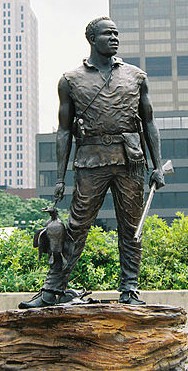York | |
|---|---|
 York statue at Riverfront Plaza/Belvedere, Louisville, Kentucky | |
| Born | 1770–75 |
| Died | After 1815 |
| Occupation(s) | Body servant (enslaved), explorer |
| Employer | Enslaved by William Clark |
| Known for | Participating in the Lewis and Clark Expedition |
| Spouse | 1 |
| Parent(s) | Old York, Rose |
| Relatives | Juba (brother), Nancy (sister), Scipio (half-brother), Daphney (half-sister) |
| Military career | |
| Service/ | |
| Years of service | 1803–1806 |
| Rank | Sergeant (honorary posthumous – Presidential citation) |
York (1770–75 – after 1815)[1] was an American explorer[2] and historic figure, being the only African-American member of the Lewis and Clark Expedition. He participated in the entire exploration and made significant contributions to its success.[3]: 302 [4]: 152 He was the first African American to cross the continent and see the Pacific.[4] He has become an American icon and several monuments depicting him have been erected honoring his legacy.[5][6][7]
York was born enslaved, the son of Old York and Rose, who had been enslaved by John Clark III, William Clark's father.[8] William inherited York from his father in 1799. York was a large man; his weight has been estimated as 200 pounds (91 kg).[9] He was about the same age as Clark, perhaps a few years older or younger, and naturally strong.[10][page needed][11] His skin was dark: he was "black as a bear", said one who knew him,[12] and his hair was short and curly.[13] Like most of the enslaved, York was illiterate, and information about him is scant.
York expected to be given his freedom after the successful expedition was over, in view of what he called his "immense services",[11] but Clark refused repeatedly and became angry when York would not go back willingly to his pre-expedition role of submissive body servant. He also expressed irritation at York's insistence on remaining in Louisville, where his wife and possibly children were. He whipped York and eventually sold him.[4][9]
Documentation concerning York is lacking for the years immediately following the expedition. About 20 years later, Clark told Washington Irving that he had freed York and set him up in business, giving him six horses and a large wagon to start a drayage business moving goods between Nashville and Richmond.[4] However, according to Clark as reported by Irving, York was lazy, would not get up in the morning, did not take good care of his horses, longed to return to slavery, and died of cholera. However, the credibility of this report is dubious.
- ^ Holmberg, James J. (2001). "York". In Klebee, John E. (ed.). Encyclopedia of Louisville. University Press of Kentucky. p. 962. ISBN 978-0-8131-2100-0. Archived from the original on 2021-09-06. Retrieved 2021-08-31.
- ^ Carole (March 12, 2019). "York: The American Hero". Denver Public Library.
- ^ Cite error: The named reference
Millnerwas invoked but never defined (see the help page). - ^ a b c d Cite error: The named reference
Searchwas invoked but never defined (see the help page). - ^ Clark, William (4 June 2021). "York in the Journals". lewis-clark.org. Archived from the original on August 18, 2021. Retrieved August 20, 2021.
- ^ "Final Years of York's Life (U.S. National Park Service)". Archived from the original on August 15, 2022.
- ^ "Overlook Park in Great Falls, Montana on the Lewis and Clark Trail". Archived from the original on December 25, 2021.
- ^ Clarke, Charles G. (2002). The men of the Lewis and Clark Expedition : a biographical roster of the fifty-one members and a composite diary of their activities from all known sources. Lincoln, Nebraska: University of Nebraska Press. ISBN 0-8032-6419-4. OCLC 48870926.
- ^ a b Parks, Shoshi (March 8, 2018). "York Explored the West With Lewis and Clark, But His Freedom Wouldn't Come Until Decades Later". Smithsonian Magazine. Archived from the original on 2020-05-20. Retrieved 2020-04-21.
- ^ Ambrose, Stephen E. (15 February 1996). Undaunted courage : Meriwether Lewis, Thomas Jefferson, and the opening of the American West. New York: Simon & Schuster. ISBN 0-684-81107-3. OCLC 33044492.
- ^ a b Toure, Ahati N. N. (2021). "Enslaved Afrikan Adventurer". Lewis and Clark Trail Heritage Foundation. Archived from the original on 2021-09-01. Retrieved 2021-09-01.
- ^ Tubbs, Stephenie Ambrose; Jenkinson, Clay (2003). The Lewis and Clark companion : an encyclopedic guide to the voyage of discovery. New York: Henry Holt. p. 321. ISBN 978-0-8050-6725-5.
- ^ Lewis, Meriweather (August 16, 1805). Journals of the Lewis and Clark Expedition. University of Nebraska Press. Archived from the original on 2021-09-05. Retrieved September 2, 2021.
© MMXXIII Rich X Search. We shall prevail. All rights reserved. Rich X Search
